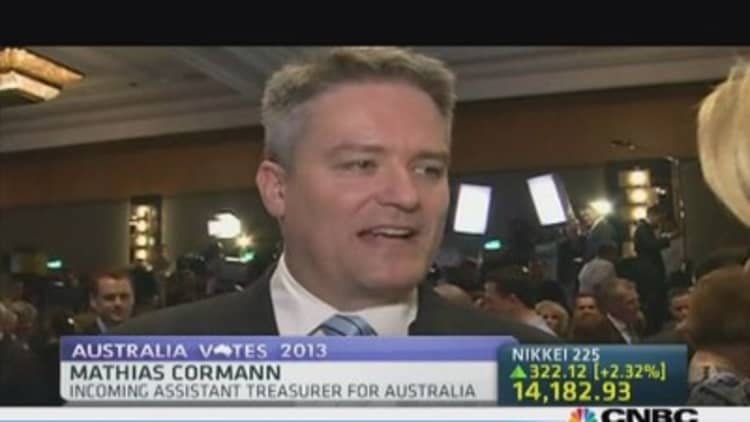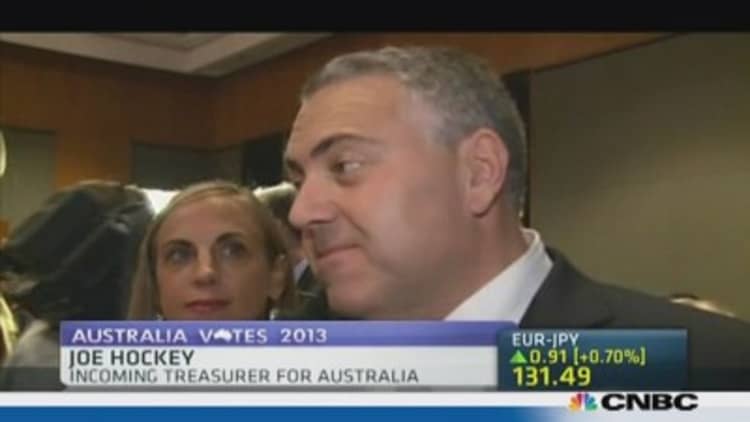Australia's protracted election campaign is finally over – signaling a boost to business confidence that could encourage the country's central bank to delay another interest rate cut, analysts say.
Conservative leader Tony Abbott swept to power in Saturday's federal election, with his Liberal-National Party coalition on track for a 32-seat majority in the 150-seat parliament, according to election officials.
(Read more: Tony Abbott wins landslide Australia election victory)
While the new government's economic policies are not expected to differ significantly from the outgoing Labor government, analysts say the fact that the election is now over should boost confidence and investment plans that were on hold before the election should now be implemented.
"The macro-economic framework under both main parties is similar," Paul Bloxham, chief economist for Australia at HSBC, told CNBC Asia's "The Call" on Monday.
"Really, the big event this weekend was that we got past the election, so there's a bit less uncertainty and that will provide some support to business confidence," he added. "The fact that the election was announced so early in the year is one of the things that have weighed on confidence."

Australia's benchmark stock index rose 0.6 percent on Monday, while the Australian dollar firmed to a three-week high at 0.9220 per U.S. dollar, as the landslide conservative coalition victory and upbeat Chinese economic data over the weekend boosted investor sentiment.
Rate cut delayed?
Analysts at National Australia Bank (NAB) said any significant boost to business sentiment could encourage the Reserve Bank of Australia to keep interest rates steady at a record low of 2.5 percent in the months ahead.
(Read more: Australia's central bank mangles message on A$, rates)
"The risk is that it is possible a post-election burst in confidence sees the timing for the next rate cut delayed," they said in a note.
The RBA has slashed borrowing costs eight times since November 2011 to bolster the economy, especially non-mining sectors as mining investment slows.
Abbott, a former student boxer and trainee priest, becomes prime minister at a time when Australia's economy is adjusting to the end of a mining investment boom, which has slowed government revenues.

"The real challenge is getting our house in order so that the long-term budget position is corrected," Jeremy Thorpe, chief economist at PricewaterhouseCoopers, told CNBC. "We either need to cut spending drastically or increase taxation," he added.
(Read more: Australia's closely-fought elections: What's at stake)
Abbot has pledged to cut Australia's mining tax, carbon tax and implement a paid parental leave scheme.
Ratings agency Standard & Poor's said on Monday that Australia's AAA sovereign credit rating and stable outlook were not immediately affected by the election results.
Stock market boost
Shane Oliver, head of investment strategy and chief economist at AMP Capital, said the election boded well for Australian stocks. He said that after eight out of 11 elections held since 1983, the stock market was up three months later with an average gain of 5.4 percent.
(Read more: Bottom line on Aussie earnings: Not too bad)
"Over the last 30 years Australian shares have generally risen after Federal elections," he said in a note. "Coalition policies with a focus on cutting taxes, refocusing government spending on productivity enhancing infrastructure, smaller government and less regulation promise to be business friendly, which should be positive for confidence and the economy," he added.
Australia's stock index was trading at 5,172 points on Monday and is up about 19 percent this year, one of the best-performing equity markets in the Asia-Pacific region.
—By CNBC.Com's Dhara Ranasinghe; Follow her on Twitter @DharaCNBC


